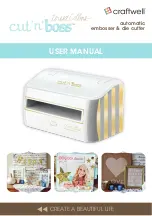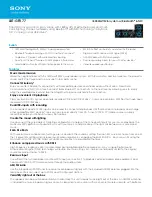
INSTRUCTION MANUAL
Static Remover Fan-type Ionizer
ER-F12 / ER-F12S
MJE-ERF12F12S No.0054-38V
Thank you very much for using Panasonic products. Please read this Instruction
Manual carefully and thoroughly for the correct and optimum use of this product.
Kindly keep this manual in a convenient place for quick reference.
WARNING
Never use this product with a device for personnel protection.
In case of using devices for personnel protection, use products which meet laws
or standards, such as OSHA, ANSI or IEC etc., for personnel protection applicable
in each region or country.
Do not use this product in places where there may be a danger of
fl
ammable or
combustible items being present.
Clean the discharge needle regularly (about once every two weeks), otherwise
optimum charge removal performance may not be obtained and
fi
re or operating
problems may occur.
If this product is used in an airtight room, ozone emitted from this product may be
detrimental. Therefore, in order for this product to be used in an airtight room, be
sure to keep the room ventilated.
Do not direct ionized air toward the face. Ozone may cause irritation to places
such as the nose and throat.
Since the tip of the discharge needle is sharp, take
suffi
cient care in handling the
discharge needle, or injuries may result.
Be sure to ground the frame ground (F.G.) terminal, otherwise electric charge
removal may not be reliable.
1
OUTLINE
This product is a fan-type charge removal device which uses ion generation from
corona discharges.
The device is suitable for a variety of charge removal applications. It is equipped
with a straight louver which is ideal for long-distance charge removal, and an angle
louver which is ideal for wide-range charge removal.
The fan speed can be adjusted to one of four settings.
2
PART DESCRIPTION
Caution label (Note 2)
Power switch
Power connector
LEDs
Bracket
Fan speed
select switch
(Note 1)
M5 screw
M5 screw
Louver
Filter cover
Description of each LED
POWER ...........Lights up when the power is turned on.
(Power indicator)
DSC .................Lights up when discharge is occurring normally.
(Discharge indicator)
DSC ERROR ...Lights up when an abnormal discharge is detected.
(Discharge error indicator)
FAN ERROR ....Lights up when a problem with fan operation is detected.
(Fan error indicator)
Notes: 1) Fan speed select switch
At the time of shipment from the factory, the device is set to fan speed 4 (MAX). Use a
fl
at-tipped screwdriver to adjust the fan speed.
Notes:
2) Caution label
Attach whichever accessory caution label is written in the appropriate language for the
region of use.
3
I/O CIRCUIT DIAGRAM
4
MOUNTING
Be sure to turn off the power before carrying out angle adjustment for this product,
otherwise accidents or problems with operation may occur.
Remove the bracket from the main unit, and then secure it to the installation
location.
Use the holes in the base of the bracket to secure it with screws.
The vertical angle of the product can be freely changed by loosening the two M5
screws. After adjusting the angle, retighten the screws to secure the device so
that the angle will not change. The tightening torque for the M5 screws at this time
should be 1.2 N•m or less.
Attach the accessory rubber cushion to bracket as shown in the below diagram to
suit the usage.
5
OPERATION MATRIX
Indicators (
○
: Lights up,
●
: Off)
Error output
(normal
close)
Discharge
operation
Fan
operation
POWER
DSC
DSC
ERROR
FAN
ERROR
Green
Green
Red
Red
Normal
○
○
●
●
ON
ON
ON
Discharge error
○
●
○
●
OFF
OFF
OFF
Fan error
○
●
●
○
OFF
OFF
OFF
Discharge halt input
○
●
●
●
ON
OFF
ON
* Once an error is detected, the error status will be maintained until the power is turned off and back
on again.
Remove the cause of the error and then turn the power back on.
If the cause of the error is not removed, the error status will continue.
* Discharge halt input is disabled when an error status is active.
6
LOUVER SELECTION
Straight louver (blue)
200mm
600mm
700mm
1500mm
Angle louver (white) (Note 1)
200mm
[Diagram with louver attached]
[Diagram of charge removal area]
This product includes two types of louver as accessories. Select the type of louver to
use based on the charge removal area.
Straight louver
This louver provides excellent direction stability for the air. It is ideal for cases where
rapid charge removal for objects is required, or when the object is some distance away.
Angle louver
This louver is excellent at dispersing the air. It is ideal for charge removal over a wide
area.
Notes: 1) The discharge needle unit is loaded on the straight louver before shipment. To replace it
with the angle louver, refer to the discharge needle unit installation procedure in "
7
CARE
AND MAINTENANCE
" in this manual.
Notes:
2) If no louver is attached, the device will not turn on even when the power is supplied.
7
CARE AND MAINTENANCE
Be sure to turn off the power before carrying out cleaning and maintenance.
The discharge needle has a sharp point, so be very careful when cleaning the needle.
If the device is used for a long period, dust and other foreign particles may
accumulate on the discharge needles or on the fan
fi
lter, and so the needles and
fi
lter should be cleaned before use.
If the device is not cleaned regularly, the charge removal performance will drop and
operating problems or accidents may occur. Clean the device regularly, using the
following as a guide.
Discharge needle unit: Every 2 weeks
Fan intake
fi
lter: Every 2 weeks
The discharge needle is a consumable part. If the discharging performance is not
restored after the discharge needles have been cleaned, it is recommended that
you replace the discharge needle unit. It is recommended that you replace the
discharge needle unit after about 10,000 hours of operation.
Cleaning the discharge needle unit
Check that the power is turned off and that the fan has completely stopped.
Following the removal procedure of the louver, remove the louver from the main
unit.
Clean with the discharge needle loaded. Use a cotton swab or similar tools
moistened with alcohol to clean the discharge needles and the areas around them.
If the needles are particularly dirty, use a brush (such as a toothbrush) moistened
with alcohol to rub them clean, and then use a cotton swab to wipe them.
<When using a commercially-available ultrasonic cleaner for cleaning>
Following the removal procedure of the discharge needle unit, remove the
discharge needle unit from the louver, and immerse the discharge needle unit
into the cleaning tank to clean them. After that, dry the discharge needle unit well.
Following the installation procedure, install the discharge needle unit to the louver.
Following the installation procedure, install the louver to the main unit.
③
①
④
⑤
②
D
1
: Power supply reverse connection protection diode
D
2
: Output protection diode
D
3
: Input protection diode
Z
D
: Surge voltage absorption Zener diode
T
r
: NPN output transistor
Internal circuit
Users’ circuit
*1
Non-voltage contact or
NPN transistor/open collector
or
Low (0V)
: Discharge halt
High (Open) : Discharge (operation start)
Main circuit
24V DC
±10%
30V
DC max
50mA max
Error output
Discharge halt input
Load
l
Pin layout
Terminal no. Terminal name
(From cable insertion side)
F.G.
+V
0V
Error output
Discharge halt input
Recommended wire : AWG 25~12
l
Option (sold separately)
ER-FAPS-J
:
AC adapter
l
About wiring cable <Recommendation>
Compatible electric wire:
AWG25#25 - 12
(Nominal cross-sectional area: 0.16 - 3.3 m
2
)
Work dimension of electric wire: 7 mm
(figure below)
* Do not solder-plate the end of the electric wire
to be wired to the connector. The tightened
screw may become loose and the wiring may be
disconnected.




















